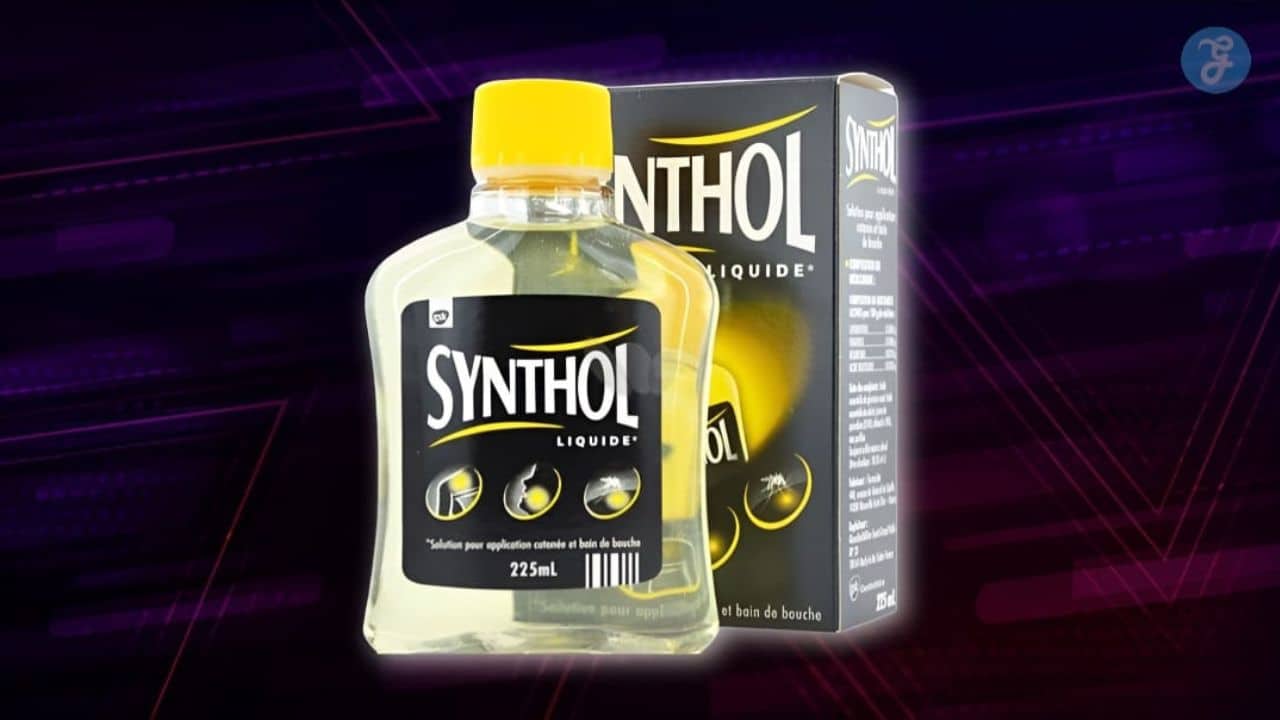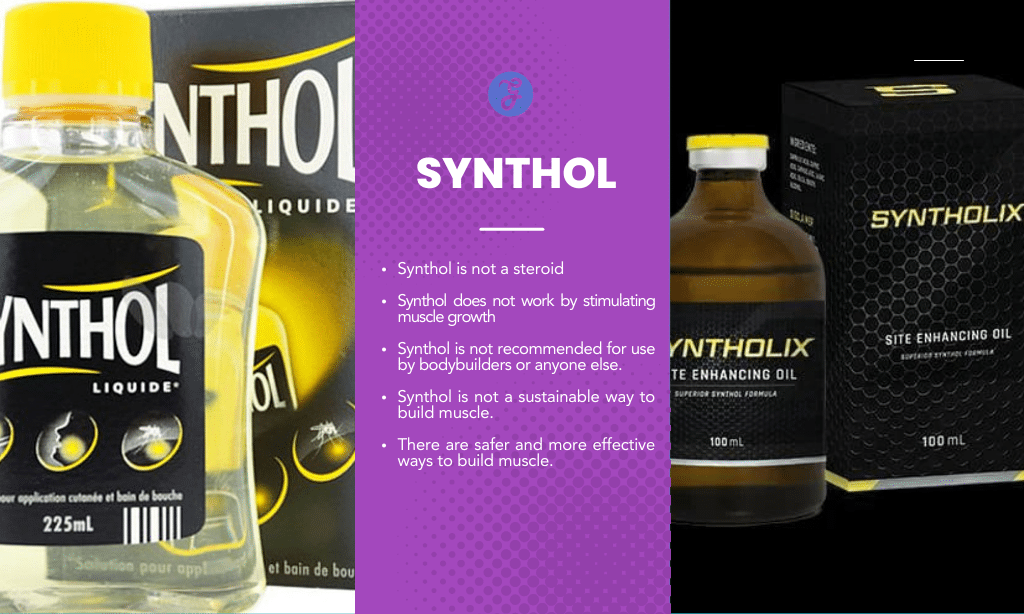Synthol has become a popular choice for bodybuilders all over the world. It’s an injectable solution that helps enhance muscles instantly and produce big, bulging results in no time.
Unfortunately, there are serious health risks associated with using this substance. In this article, we explore the truth about Synthol—all you need to know, including its latest updates in 2023—so you can make an informed decision before using it.
Here, you will find out how Synthol works, its popularity among bodybuilders with details of potential health hazards linked to its use, plus the side effects of taking such injections twice a month or more frequently, as has been rumored lately.
Finally, we look at comparisons between Synthol and other steroids while discussing the impact on bodybuilding culture and regulations based on its usage today. Now is the right time to get informed and understand everything you need to know about Synthol, so dive into this article now!
Content Highlights
- Synthol is an oil-based solution used for bodybuilding, designed to enhance muscles without any permanent changes temporarily.
- Although it produces instant and visible results with no muscle growth whatsoever, there are potential health risks if not administered properly, such as nerve damage or infections.
- Social media influence has made Synthol increasingly popular among bodybuilders who turn to it as an alternative means of gaining bulk since its low cost and accessibility make it enticing despite the lack of long-term safety data.
- Immediate side effects linked to synthol usage include pain, bruising, swelling, and redness, followed by more severe consequences if done emotionally, with ulceration at the site of injection over potentially forming abscesses in extreme cases due to overuse; hence users need to exercise caution cautiously when considering its use either medically or professionally.
What is Synthol?
Synthol is an oil-based solution used for bodybuilding, which helps create a temporary implant that immediately enlarges muscles.
Synthol is an injectable oil that is used by bodybuilders to create larger bulges in their muscles. It is typically made up of a mixture of medium-chain triglyceride (MCT) oil, lidocaine, and benzyl alcohol.
MCT oil is a type of fat that is easily absorbed by the body. When it is injected into a muscle, it draws water into the muscle cells, which causes them to swell. Lidocaine is a local anesthetic that helps to numb the pain of the injection. Benzyl alcohol is a preservative that helps to prevent the growth of bacteria.
Synthol is not a steroid, and it does not work by stimulating muscle growth. Instead, it works by creating a temporary enlargement of the muscles. This effect can last for several days or weeks, but it will eventually fade as the body metabolizes the oil.
Synthol is not recommended for use by bodybuilders or anyone else. It can cause a number of serious side effects, including:
- Infection
- Abscesses
- Nerve damage
- Muscle damage
- Deformities
- Blockages in the blood vessels
- Death
Usage in bodybuilding
Synthol is a temporary implant used by bodybuilders to give muscles an instantly pumped-up appearance. It consists of 85% oil, 7.5% lidocaine, and 7.5% alcohol, which, when injected deep in the muscle tissue, causes it to expand rapidly within seconds or minutes upon injection with no muscle growth whatsoever, causing an immediate enlargement effect.
Many competitive bodybuilders use Synthol injections to prepare for competitions due to their popularity on social media platforms like Instagram, where influencers show their impressive Synthol results that are attractive but not necessarily achievable through natural means.
Unfortunately, this has led some users to take excessive amounts risking significant health issues such as infection and nerve damage can occur from incorrect administration or overdosing. Synthol usage leads many medical professionals to warn against its long-term effects if misused regularly, even though it is not classified as a steroid medication.
Temporary implant
Synthol is a synthetic chemical solution primarily used by bodybuilders seeking a more enhanced and muscular physique. It works by being injected directly as an implant into the muscle itself, providing immediate enlargement effects upon injection.
As the name implies, Synthol is not a type of steroid but its own unique mixture of 85% oil, 7.5% lidocaine, and 7.5% alcohol which can boast increases in muscle size of up to 25%. Although this might be tempting for some athletes looking for quick results with minimal effort, it comes with its set of caveats and potential health risks that must be carefully considered before usage.
In addition to nerve damage from deep muscle injections or inflammation due to foreign substances being inserted into the tissue, improperly using Synthol can also lead to infections if instructions are not followed correctly while administering it through self-injection methods or general hygiene practices aren’t taken seriously during application.
Read More: Top 12 Exercises to Get Rid of Hip Dips and Build Muscle Properly
Immediate enlargement effects
Synthol injections offer an instant way for bodybuilders to enhance their muscle size, with results seen in as soon as 30 minutes. The injection site is saturated with a solution of 85% oil, 7.5% lidocaine, and 7.5% alcohol, which causes the muscles to balloon up quickly and artistically shape them.
People who use Synthol report that they have noticed instantaneous effects on their targeted areas, including shoulders, biceps, and triceps. Other than giving muscle definition and size changes instantly, these injections do not increase strength or athleticism – rather just give the feeling of bulkiness without any performance enhancement qualities such as increased power and speed.
It’s important to note that if not administered correctly by professional standards, there is a risk of severe deformities appearing in the injected area and other potential side effects like inflammation or infection at the injection site.
How Synthol Works
Synthol is injected deep into muscles to create a temporary augmentation, often used to enhance muscle appearance.
Deep muscle injection
Deep muscle injection, or intramuscular injection, is a process in which Synthol is directly injected into the muscle. The product comprises 85% oil, 7.5% lidocaine, and 7.5 % alcohol, designed to slowly release into the muscles over time, providing an immediate enlargement effect. Generally, bodybuilders inject this fluid into their biceps, triceps, deltoids, and calf muscles for deep muscle injection.
Although it provides immediate tissue swelling, which temporarily increases the given body part’s size, Synthol does not improve strength or muscular endurance. Thus, its use in competitive sports is controversial and mostly disapproved by athletic organizations for the unfair advantage it offers through the temporary illusion of size. Such misuse can lead to long-term health issues such as nerve damage, inflammation & pain, and the risk of infection if administered incorrectly.
Cosmetic muscle enhancement
Synthol is a temporary implant that is injected deeply into the muscle to provide immediate and long-lasting enlargement. Bodybuilders can use this type of cosmetic enhancement as an alternative to more dangerous forms of muscular development, such as steroids.
When Synthol is injected, it temporarily inflates the muscles with oil mixtures, fillers, and other chemicals, producing an artificial “bulking up” appearance in a matter of moments.
These injections are becoming increasingly popular among bodybuilders who are looking for shortcuts in their training programs. Unlicensed oils and fillers that mimic synthetic growth hormones, including Johnson’s brand Baby oil, can also be used in combination with Synthol for a longer-lasting effect on muscle size.
Popularity of Synthol
Synthol has gained immense popularity among bodybuilders in recent years due to its accessibility and availability.
Rise in usage among bodybuilders
Synthol has become a popular choice for bodybuilders looking to instantly enhance their muscle appearance and potentially gain a slight competitive advantage over the competition. Synthol is an oil-like substance injected into muscles to temporarily expand its size, providing users with a more muscular look almost immediately after injection.
The desire for an instant boost in muscle mass without having to take time to train and diet through natural means has been the main attraction of Synthol among bodybuilders. Furthermore, accessibility and affordability of this drug have further contributed towards its increasing usage, as it is widely available on the black market and has low cost compared to other substances used for performance enhancement purposes.
Despite potential health risks associated with synthol, such as nerve damage, inflammation, pain, infection risk, etc., many bodybuilders are still using it due to its immediate effects despite the lack of long-term safety data associated with it.
Social media influence
Social media has played a significant role in growing awareness of and fascination with Synthol. Bodybuilding influencers on various platforms have effectively promoted the use of Synthol, and this, combined with its accessibility over social media, has contributed to an increase in its use among bodybuilders.
The “Brazilian Hulk,” for example, documented his transformation from plain-looking muscles to hyper-inflated ones due to deep muscle injection of oil into his muscles—an extreme form of Synthol abuse.
Similarly, numerous other people openly talk about using the substance as part of their workout regimens on Instagram. As such, it’s clear that social media outlets—including YouTube and Facebook—have popularized the dangerous practice often done without precaution or proper understanding among many athletes looking for fast results.
Availability and accessibility
Synthol is widely available on the Internet, making it easily accessible to anyone. Its popularity has increased significantly recently, particularly in Brazil, Argentina, and Colombia.
Although the FDA has not approved Synthol for body enhancements, its easy access makes it appealing to some people who are looking for an immediate enlargement effect that can be achieved through a single injection session.
Self-injection of body fillers, including Synthol, is often associated with distinct cultural groups as well due to its easy availability online and lack of need for medical supervision or prescription.
Potential Health Risks of Synthol
Synthol usage harms users’ health and safety, so it’s important to fully understand the risks before deciding on its use.
Not a type of steroid
Synthol is a commercial name for an oil-based topical implant that contains 85% medium-chain triglyceride oil, 7.5% lidocaine (a local anesthetic to reduce discomfort during the injection process), and 7.5% alcohol.
It is designed to enhance muscle size by temporarily giving them more volume due to increased adipocyte cells within the target muscle group(s). Synthol does not contain steroids or any other performance-enhancing drugs that are commonly found with anabolic steroids – thus, it should not be confused as such and can’t be recognized as one in any way or form when drug tested for competitions.
Furthermore, unlike anabolic drugs, Synthol has no immediately long-lasting effects on strength gains, as its main purpose is just cosmetic rather than functionality purposes when compared side-by-side with steroid use in bodybuilding diversion/events.
Side effects
Synthol has been linked to an increased risk of stroke, nerve damage, infections at the injection site, and various other complications. Immediately following an injection, users may experience pain, redness, bruising, swelling, and more severe side effects. Over time the deep muscle injection may lead to muscle deformity, ulceration, and abscess formation in the area of application.
It is important to note that Synthol does not contain any steroids and is not approved for medical use – so users should be aware of the potential risks involved with its use. Additionally, athletes and medical personnel should be mindful of the serious side effects of Synthol injections and the potential systemic and life-threatening risks they can pose.
Dangers of improper usage
Synthol is dangerous when not used correctly, and bodybuilders are at risk of extreme physical abnormalities, systemic complications, and even the danger of embolism if Synthol is injected incorrectly.
Without proper injection technique, Embolic clots can form within veins, resulting in migration to different organs or blood vessels, leading to occlusion of these structures and subsequent death due to lack of oxygen.
Due to its highly viscous nature, it has a larger chance for infection after deep muscle injections and may cause permanent nerve damage and inflammation leading to incontinence issues. Individuals should take caution with their usage as uncontrolled doses will result in serious health repercussions ranging from cardiovascular disorders associated with oil accumulation or anabolic hormone suppression resulting from prolonged use.
Read Also: Does Creatine Have Calories: Building Muscle, Not Calories
Legality of Synthol
Synthol is prohibited in some countries, and its use has been the subject of debate in others.
Legal status in different countries
Synthol’s legal status varies considerably across different countries. Let’s take a glance at the situation in a few nations:
| Country | Legal Status |
|---|---|
| USA | Legally accessible but not approved for muscle injection. |
| Brazil | Widespread usage, despite potential health risks and legal complications. |
| Argentina | Legally available, but usage is frequently linked to bodybuilding culture, with potential legal complications for muscle injection. |
| Colombia | Popular in bodybuilding circles, with potential legal issues for misuse. |
| Other Countries | The legal status isn’t well-documented or widely known. More updates are expected in 2023. |
This table sums up the current legal status of Synthol in the mentioned countries. The legal status in other nations might vary, with ongoing developments and updates expected in 2023.
Controversy surrounding its use
Synthol has become increasingly popular among bodybuilders, but it remains highly controversial due to its potential risks to health and competitive integrity.
Synthol is not approved by medical professionals as a safe or effective method of bodybuilding enhancement, with those who use it risk serious side effects such as nerve damage and infection.
In addition, there are concerns over its use in competition as some feel users who inject synthol can have an unfair advantage. The legality of using Synthol varies from country to country; however, many organizations only permit natural bodybuilding techniques that don’t include any type of muscle implant aid like Synthol to compete fairly.
Association with other banned substances
Synthol is often associated with other banned substances that are commonly used by bodybuilders to enhance its effect. For example, the combination of Synthol and anabolic steroids can seriously put the user’s health at risk due to potential side effects such as nerve damage, inflammation and pain, infection risks, and even potential addiction.
Apart from the physical dangers that come with this kind of usage, there are legal concerns surrounding Synthol in many countries, including the debate over its use in competitions and criticism from natural bodybuilders, which has impacted the perception of it within the bodybuilding community.
Moreover, due to its association with these banned substances, there is also a heightened likelihood of athletes using them together for performance enhancement which could lead to harsher punishments given if discovered or revealed by testing procedures.
Side Effects of Synthol Injections
Common side effects of Synthol injections include nerve damage, inflammation, pain, and risk of infection.
Nerve damage
Synthol use can lead to direct nerve damage due to the deep muscle injection of its active ingredients. This type of trauma to nerves, often caused in an unregulated way by amateurs, can not only result in impaired sensation and loss of function but could be fatal if uncontrolled or left untreated for too long.
Synthol does not penetrate deeply enough into muscle fibers, so it cannot supply nutrients and oxygen necessary for maintaining normal metabolic processes within muscles–leading to a buildup of toxic metabolites that accumulate in the nervous system tissues and can cause irreversible damage, including paralysis.
When injected correctly with proper precautions taken, however, negative effects on nerves are usually temporary, although they require medical attention as soon as possible before symptoms worsen.
Inflammation and pain
Synthol injections can lead to different kinds of discomfort for those who use the substance, with one of the most common adverse reactions being inflammation and pain. Inflammation is an immune response involving redness, swelling, pain, and loss of function.
This kind of reaction can cause scarring or muscle fibrosis if not taken care of properly, which could be a major problem in severe cases. Pain associated with Synthol usage comes from the injection itself but also due to other potential risks such as side effects like nodular indurations and swellings at target muscles where oil was injected before.
Myositis (muscle hardening) is another condition caused by excessive muscle enlargement accompanied by erythema (redness), swelling, heat sensation, and even itching around involved areas in individuals who used intramuscular oil injections, including Synthol products.
Infection risk
Synthol has serious potential to lead to infection if injected into the body, regardless of whether it is used in a professional medical setting or otherwise. When Synthol is not administered properly, there exists a risk for things like redness and pus formation, along with severe infections that can affect the muscles and other areas of the body.
Such issues could result in stroke or nerve damage should they go untreated. Consequently, those considering using Synthol must keep in mind its short-term benefits and long-term risks that come with its improper usage.
Infection caused by Synthol could easily cause permanent deformities and health complications, which makes it clear why seeking safer alternatives is much more desirable from both a medical and aesthetic perspective instead of taking unnecessary risks associated with an unregulated substance such as Synthol injections.
Comparison with Anabolic Steroids
Synthol and anabolic steroids can create similar effects yet vastly differ in their components and risks – understanding them will help you weigh the options.
Differences between Synthol and steroids
Synthol and anabolic steroids are very different products, both in how they work as well as their effects on muscle growth. Anabolic steroid injections bind to the androgen receptors of cells, while corticosteroids such as Synthol only temporarily provide a cosmetic enlargement effect by deep-muscle injection without any hormonal influence or binding to cell receptors.
In terms of their impacts on muscle growth, anabolic steroids create long-term results that won’t diminish until the cycle is over, whereas with injecting Synthol, there will be no lasting changes.
Additionally, an independent study found that when it comes to addiction potential, although all drugs can be subject to misuse resulting in dependence tendencies, usage of anabolic steroids has been shown to result in significantly higher rates compared with those who use synthol.
Effects on muscle growth
Synthol injections can temporarily extend muscle fibers, causing an immediate enlargement effect for bodybuilders. The main ingredient in Synthol is 85% oil, with 7.5% lidocaine and 7.5% alcohol as trace additives.
When injected into the desired muscle group, it leads to increased tissue displacement, resulting in a larger appearance of muscles through what are known as ‘lumps’ or ‘bumps’ – although permanent growth varies from person to person.
While Synthol does not promote true muscle growth like anabolic steroids, it does provide benefits such as increasing visibility of underlying muscle structures and enhancing training results when used correctly and safely.
Potential for addiction
When it comes to Synthol, there is a potential for addiction. Around 32% of individuals who misuse anabolic steroids such as Synthol become dependent on them and experience symptoms like tolerance, withdrawal, and continued use despite negative consequences.
Moreover, AAS dependence is likely influenced by both psychosocial and biological factors. The positive effects that can be experienced from using anabolic steroids, like increased strength, may contribute to the addictive nature associated with Synthol injections.
In addition, once individuals get used to taking these drugs, they may experience serious withdrawal symptoms when they stop or reduce their dosage, which can make stopping difficult for many people.
The Impact of Synthol on Bodybuilding
This is a contentious issue, with opinions divided in the bodybuilding community regarding its place in competitions and criticism from natural bodybuilders for those using Synthol for muscle enhancement.
Debate over its use in competitions
The use of Synthol in bodybuilding competitions is a subject of intense debate, as hypotheses about its potential advantages and risks have caused much controversy. In the process of providing an enhanced physique through cosmetic muscle enhancement, opponents believe that it threatens to undermine core values such as commitment, dedication, and skill.
On the other hand, proponents argue that proper application of Synthol can be beneficial for professional bodybuilders who are already highly committed to their craft, allowing them to optimize physical characteristics beyond what could realistically be achieved through natural training methods alone.
Despite both sides making compelling arguments, there is yet agreed-upon solution with regard to this ongoing issue.
Criticism from natural bodybuilders
Natural bodybuilders have condemned using Synthol in bodybuilding due to its dangerous nature and lack of producing true muscle development. Taking too much or using it more frequently than necessary can cause long-term health complications like tissue death, blood clots, jaw pain, and even death.
Furthermore, many natural bodybuilders feel that allowing injected concoctions into a competitive landscape is unfair when compared to traditional methods such as weight lifting and dieting.
This raises concerns about compromised integrity, which may lead some athletes to take extreme measures to gain an edge over their competitors, relying on pure skill without synthetic additives.
Additionally, there is not enough research regarding potential long-term side effects since this chemical is relatively new in comparison with other performance-enhancing drugs used by athletes today.
Read More: HMB Supplement: The Future of Muscle Preservation and Recovery
Perception in the bodybuilding community
The use of synthol is highly debated in the bodybuilding community, with varying opinions on its effectiveness and safety. On one side, some members view it as a shortcut to muscle growth that cheats the natural process, while others leverage it as a legitimate strategy alongside proper diet and exercise.
Natural bodybuilders frequently criticize those who use it for bypassing hard work and dedication. Synthol has been associated with health complications such as infections, deformities, and nerve damage caused by improper usage – causing several members to question or reject its use altogether.
There have also been discussions around introducing rules or bans regulating the use of synthol in competitive bodybuilding events due to safety concerns. Despite this opposition, there are many within the industry who continue to embrace synthol as part of their routines leading up to competitions.
Final Words
Synthol is a controversial supplement that can negatively affect an individual if used incorrectly or in excess. As potential health risks are associated with its use, caution should be exercised when considering using this type of product for muscle enhancement.
Overall effectiveness and safety
Synthol injections have never been scientifically proven effective and can pose serious risks. Several potential side effects are to be considered, including pain at the injection site, nerve damage, ulceration, muscle deformity, and other cardiovascular health risks.
It is important to note that Synthol is not a type of anabolic steroid; it will not directly lead to increased muscle growth or strength gains. Moreover, it has no clinical evidence of safety or effectiveness for bodybuilding purposes, so extreme caution must be exercised before undergoing such treatments.
According to the FDA, warnings on bodybuilding products in 2023, including items containing Synthol industrial oil, may cause long-term adverse reactions like infections with permanent disfigurement if injected improperly.
Advice for those considering using Synthol
The use of Synthol is not without its risks and potential dangers. There is a risk of deep-tissue damage, nerve damage, infection, inflammation, pain, and an unnatural appearance to muscles.
Consult with medical professionals before considering using Synthol, as it can put your cardiovascular health at risk. Natural bodybuilding practices are safer than using temporary implants like Synthol and may help you achieve desired results more safely in the long term.
Despite being popular among bodybuilders due to providing immediate enlargement effects, regulated substances often found in unapproved formulas that make up Synthol render its usage potentially illegal in some countries.
The future outlook for Synthol in bodybuilding culture
Synthol usage in bodybuilding, while remaining popular among distinct cultural groups, is shrouded with uncertainty and debate. Many athletes do not view Synthol as a viable path for muscle enhancement as there are many health concerns, such as inflammation, pain, and possible nerve damage.
In addition to the risks associated with its use, the long-term effects of using Synthol have yet to be fully understood, which causes further hesitation amongst potential users. What’s more, each country has different regulations on its legal status, which can limit accessibility or make it difficult to get hold of legally.
Therefore no one can confidently predict what will happen regarding Synthol within bodybuilding culture until further research attests to its safety levels or proves otherwise, making understanding the pros and cons essential before considering any kind of synthetic oil injections like synthol.
Frequently Asked Questions (FAQs)
Here we answered some commonly asked questions about Synthol. Check
1. What is Synthol?
Synthol is an injectable substance containing 85% oil, 7.5% lidocaine, and 7.5% alcohol which can be used to temporarily enlarge muscles in bodybuilding or cosmetically enhance them for cosmetic purposes.
2. What are the potential risks associated with using Synthol?
Using synthol may increase the risk of infection, nerve injury, tissue death, cyst formation, emboli (air bubbles), allergic reactions, and pulmonary complications such as airway blockage from injecting oils directly into veins or arteries.
3. How long do the effects of Synthol last?
The results of synthol injections typically only last several months before they begin to diminish, but the effects may be permanent if too much has been injected.
4. Are there any alternatives to using Synthol?
Other alternatives exist for muscle building, including a healthy diet and exercise routine that could provide better, longer-lasting results without health risks.
5. Is it safe to use Synthol in 2023?
No, it is not recommended to use synthol due to its potentially dangerous side effects and associated health risks.
Disclaimer: This content is for informational purposes only and does not replace professional medical advice, diagnosis, or treatment. This information is not comprehensive and should not be used to make health or well-being decisions. Consult a qualified healthcare professional with questions about a medical condition, treatment options, or health regimen. This website or the content should never replace professional medical advice.









































